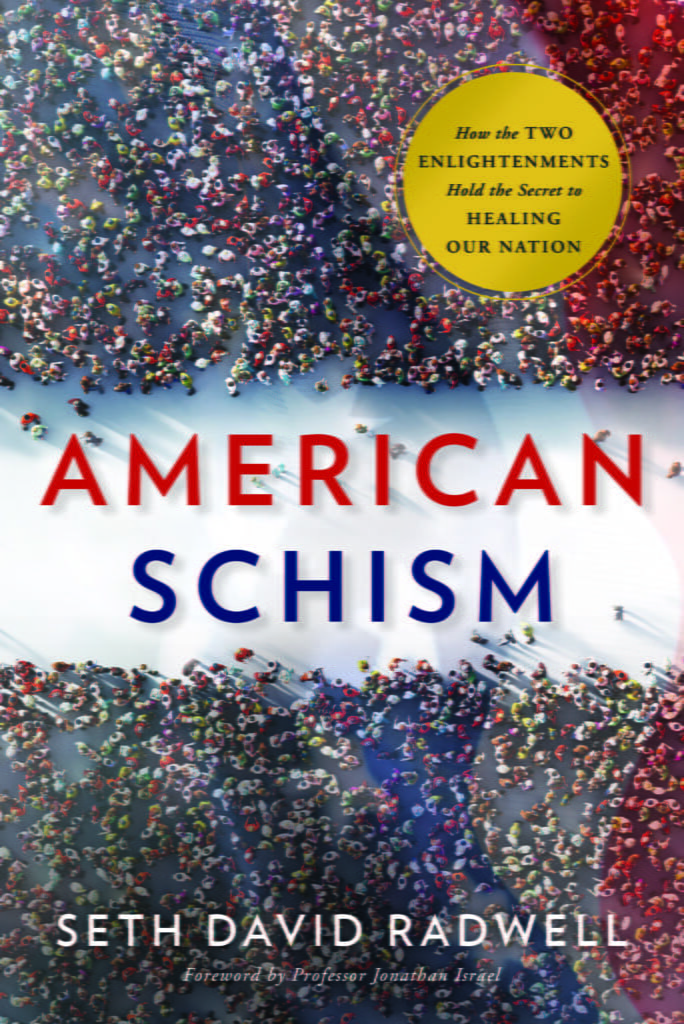Will the aftermath of the 2020 presidential election and the second year of the COVID pandemic prove that 2021 will be one of the most tumultuous political years in recent history? According to Seth David Radwell, a critically-acclaimed expert on the history of politics, and author of the Amazon bestseller American Schism: How the Two Enlightenments Hold the Secret to Healing Our Nation (Greenleaf Book Group), here is a compilation of some of the most controversial 2021 political subjects of today—contextualized in the country’s history as detailed in Radwell’s book—that will have lasting impact for the future of America:

1. The Closest Overthrow of Power since the Civil War:
The U.S. struggles to remain the world’s quintessential example of the peaceful transition of power associated with a free and open society in the aftermath of the January 6 insurrection. (In American Schism, Radwell notes the Shays’ Rebellion and separately, the Whiskey Rebellion, Washington Part I, Chapter 10, Rutherford Hayes presidency after Reconstruction). According to Radwell’s book, January 6 was not the first attack on the U.S. government by citizens. By comparing and contrasting Jan. 6 to other uprisings, we can better understand how to strike the crucial balance between the right to protest and the need to prevent violence. In these other historical cases, U.S. presidents had to hear the protests of rebels but authorize force to prevent an overthrow of government. (Chapter 7, pg. 136; and Chapter 8, pp.185-187)
2. The Most Aggressive Voter Restrictions in a Decade:
Twenty individual states have enacted comprehensive new voting laws this year, which governors signed under the auspices of “election security.” Radwell’s research illustrates that voting regulations have a rich history in America — how have these rules been used in the past, and why is this important in assessing the new voting regulations enacted this year? (Chapter 11, the South uses voting regulation laws to prevent recently emancipated slaves from voting.)
3. The Erosion of the Two-Party Political System:
During the first year of Biden’s presidency, the GOP scored a surprising night of wins on November 2. Are these a direct result of Trumpism, or has the party broken off into new factions in order to gain the vote? What does this all mean for the moderate and progressive Democrats? American Schism helps readers understand what has happened to the GOP in recent years as it struggles to retain the support of its Trumpian base while still looking forward with solutions for governing. How have parties historically struggled with these issues, and how have they adapted in prior eras? (Chapter 13, the split of the Republican Party in the age of Trump)
4. The International Role of the U.S. in the post-Afghanistan Era:
The Afghanistan exit was quite messy. Some have called it a disaster. In a world dominated by a rising China, is America’s role as the leading free society over? Radwell’s book makes a compelling argument: If the conflict of the American model vs. fascism and communism represented the great battle of the 20th century, will the struggle between democracy and autocracy prove to be the great battle of the 21st? (pp. 387-408)
5. Facts vs. Fiction—Why is Truth Being Tested in Every Major News Story?:
When discussing complex topics like COVID response (science vs. politics), climate change, immigration policy and election fraud, history and facts are what matter. We need to rely on the Constitution of Knowledge that reputable institutions and scientists have built for us; we need to listen to the experts and not rely on Steve Bannon and Alex Jones as examples. Do we have the rational tools to use our modern scientific framework to address compelling problems without challenging the definition of truth? American Schism brings forth the question: Are we now in a post-objective truth era in which we can no longer differentiate unreason from reason? Does this bode doom for our democratic form of government? (pp. 36-40, p. 287-291, pp. 396-400)
6. Building Our Country for the Next Century—Biden’s Infrastructure Bill:
American Schism clearly defines how our founding fathers dealt with much-needed funding to build America in its earliest decades. What was Alexander Hamilton’s role in the building of infrastructure early in our history? (p. 97) How have other presidents taken on the challenge? (Chapters 11 and 12, FDR and LBJ)
7. The Great Contradiction of America’s Founding: Racial Inequality:
While we have evolved significantly in the last 200 years in terms of “de jure” racial equality, the George Floyd murder (and many other horrific incidents like it) are indicative of just how far we must progress to get closer to any notion of “de facto” racial equality. Is the Black Lives Matter movement making a difference or alienating more white Americans? American Schism delineates how the great contradiction of our founding as a nation was the all-embracing credo of the Declaration of Independence contrasted with the reality of chattel slavery. (Chapters 6 and 7, then the evolution after the civil war in Chapter 10, and later into the 20th century, 11 and 12)
SETH DAVID RADWELL holds a master’s degree in Public Policy from the Kennedy School of Government, Harvard University, and a Bachelor of Arts degree summa cum laude from Columbia College, Columbia University. He is an internationally known business executive and thought leader in consumer marketing, serving as CEO of The Proactiv Company, the leading skincare brand for acne; and President and Chief Revenue Officer of Guthy-Renker, the worldwide direct-to-consumer beauty company. Radwell was also Senior Vice President, Content for Prodigy Services Company; President of e-Scholastic, the digital arm of the global children’s publishing and education company; and President of Bookspan/Bertelsmann, where he developed book clubs for diverse readership, Black Expressions and Mosaico, in addition to overseeing all editorial, marketing, media and digital functions for iconic brands such as Book of the Month Club, Doubleday Book Club and Literary Guild. He currently divides his time between NYC, LA and Paris with his family.



